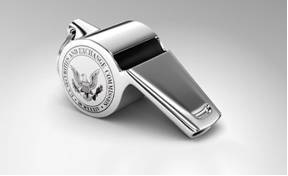Work-From-Home Brings Increase in SEC Whistleblower Tips, Demonstrating Need for Whistleblower Protection and Support

This month, the Wall Street Journal reported that the SEC has been receiving a “surge” in whistleblower reports under the SEC Whistleblower Program. The article, Tips to SEC Surge as Working From Home Emboldens Whistleblowers, states that the SEC received approximately 4,000 tips between mid-March and mid-May – in the heart of the pandemic – which represented a 35% increase over the equivalent period in 2019. One possible reason for this? The article surmises that would-be whistleblowers who are working from home are “out of view of snooping colleagues and managers, and thus safer from being exposed as whistleblowers.” No doubt this plays a role, but it begs the question. If a little more room is what whistleblowers need to come forward, are whistleblower programs doing enough to protect whistleblowers? Can they do more?
Each of the major federal whistleblower reward programs – the federal False Claims Act, the SEC whistleblower program, the CFTC whistleblower program, and the IRS whistleblower program now have provisions to protect whistleblowers from retaliation by their employers. The retaliation provisions are a vital protection for whistleblowers. However, many whistleblowers continue to be hesitant to come forward with information because of the potential consequences, including those that fall beyond retaliation from their employers. When outed as whistleblowers either through unsealing of complaints or other means, many whistleblowers face being ostracized by their colleagues and bosses or face blacklisting and discrimination within their fields for the simple fact they were a whistleblower. While attitudes are changing, whistleblowers may fear the negative perception that they are “snitches.” While whistleblower anti-retaliation laws may protect a job or secure compensation, they do little to prevent the personal and future professional toll whistleblowers face when outed.
Some whistleblower programs, including those at the SEC and CFTC offer whistleblower anonymity, even when publicly announcing whistleblower awards. In the False Claims Act context, whistleblower identities are initially protected by the court seal, but upon settlement or unsealing the underlying complaint is made public, which typically reveals the whistleblower’s identity. Regardless of the law, in many instances employers can and do figure out the identities of whistleblowers, leading to professional consequences.
That the Wall Street Journal notes the uptick in submissions to the SEC during the COVID-19 pandemic where people are working from home lends credence to the argument that even with retaliation protections in place, whistleblowers remain fearful. At the same time, whistleblowers are a vital cog in uncovering fraud and helping the government obtain penalties and recover funds. In fiscal year 2019, the U.S.:
-
-
- Recovered over $3 billion from False Claims Act cases
- Secured over $2 billion in monetary sanctions in SEC enforcement matters brought with information from whistleblowers.
- Collected over $616 million in tax recoveries attributable to whistleblower information provided to the IRS Whistleblower Program
-
Given the success of these whistleblower programs, consideration must be given to increasing the protections afforded to whistleblowers. In addition to expanded anti-retaliation provisions, whistleblower rewards can offer essential compensation to individuals who speak up – but whistleblower rewards need to be less the exception, and more the rule. Whistleblowers do not take the decision to blow the whistle lightly. The fact that risks are inherent to being a whistleblower and the potential for a monetary reward exists do not justify negative treatment of whistleblowers in any circumstances.
The plight of whistleblowers cannot be ignored. So long as fraudsters exist, whistleblowers will exist to expose their wrongdoing. It is therefore the imperative of everyone to protect those who bring that wrongdoing to light.
Read More:
- Think you have a whistleblower case?
- Whistleblower Reward Programs
- The Constantine Cannon Whistleblower Team
- Contact us for confidential consultation
Tagged in: Anonymity, Importance of Whistleblowers, Retaliation,